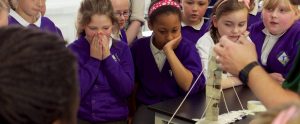Careers in the (primary) classroom?
There have been some news articles recently about universities, primary schools and careers.
In the first article, Teach First recently called for universities to work with primary schools as part of University ‘widening participation’ work. These are activities that are focused on ensuring that progression to university is open to students whatever their background. At the moment, many universities focus mostly on children in year 9 and above. According to Teach First, currently only around 1200 pupils on Free school meals go to Russell Group Universities each year, out of 800,000 young people in receipt of free school meals. As a result, they think that children should taught about university much earlier, from primary school.
A second report was published by UCAS. They surveyed students who had applied to go to university in 2015 about what encouraged or put them off. The survey found that around 35% of the students had decided that they wanted to go to university before the age of 10, and that they were more likely to get into ‘competitive universities’.
Finally, in a riposte to the Teach First suggestion, the Times Educational Supplement posted an article written by Joe Tyler who works for the Philosophy Foundation. Tyler believes that rather than pushing information about university on ever younger children, we should focus on enhancing their happiness.
He says:
Some children want things and wish for things that they might never have: becoming a world class footballer, rapper, pop star. In a world of uncertainty, we never know for sure what is going to happen, and some children will get their wish.
Yet as carers for these children we might think it better to make sure they focus on getting their good education first, by chipping away at their dreams and putting them on to the ‘safer’ route by telling them to think more about getting on with their studies and extra-curricular activities which will get them in to the best university.
The combination of these three articles got me thinking.
I’m a bit frustrated by the focus of Teach First and UCAS on Russell group and similar universities. The Russell group of universities consist of 24 universities. In 2014/15 there were 163 universities. At a rough calculation, the Russell group can accommodate just over 6% of the UK’s undergraduates. Focusing on attendance at only those universities is, to my mind, quite narrow-minded.*
That aside, I do think that Teach First and UCAS have a point. Whilst telling young children very specific details about particular universities probably isn’t appropriate, I do think that we need to let them know about the wide range of future careers available to them. It’s all very well for the Philosophy Foundation to suggest that we encourage young children to follow their dream and become a footballer or a pop star, but for the vast majority of children, that will not happen. Telling them about other jobs, isn’t expecting them to take the safe route, and might show them something else that they could dream about becoming.
That’s what we aim to do here at Think Physics. Our primary workshops are focused on different STEM fields or careers, linked to the primary curriculum. We have workshops about botanists, volcanologist, and naval architects amongst others. The pupils we work with know that the science they study can lead into a whole range of different jobs.
Let’s encourage our children to have a good education by showing them that their dreams can be much bigger than they imagined.

Structural engineering workshop
*Declaration of interest: Think Physics is not based at a Russell Group university.

